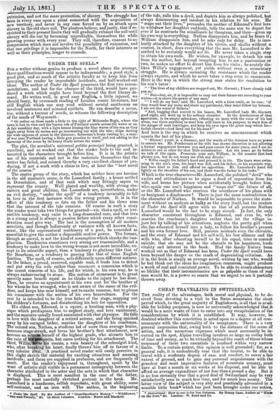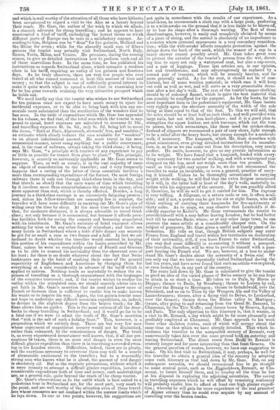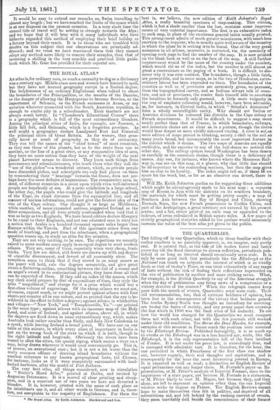CHEAP TRAVELLING IN SWITZERLAND.
Tux reality of the advantages, both moral and physical, to be de- rived from devoting to a visit to the Swiss mountains the short period which, to the great majority of Englishmen, is all that is avail- able for holiday purposes, is now so universally acknowledged that it would be a mere waste of time to enter into any recapitulation of the considerations by which it is established. It may, however, be doubted whether this conviction is acted upon to a degree at all com- mensurate with the universality of its acceptance. There is a very general impression that, owing both to the distance of the scene of action, and the numerous expenses which must necessarily be in- curred on the spot, Alpine travelling involves so large an outlay both of time and money, as to be virtually beyond the reach of those whose
i
command of these two essentials is confined within very narrow limits. To a certain extent, this opinion is well grounded; for, as a general rule, it is undoubtedly true that the tourist, to be able to travel with a moderate degree of ease and comfort, to cover a fair extent of ground, and to gain any personal acquaintance with the grandest and most impressive features of mountain scenery, mast have at least a month or six weeks at his disposal, and be able to afford an average expenditure of not less than a pound a day. But it is no less certainly true that a good deal of Switzerland may be very satisfactorily seen in much less time, and for much less money. The latter view of the subject is very ably and practically advocated in a sensible little book* which has Just been brought under our notice, • Switzerland: How to see it for Ten oldness. By Haw Gaze, Author of "Rtnla on the Feet," &c. London : W. Kent and Co.
and which is well worthy of the attention of all those who have hitherto been accustomed to regard a visit to the Alps as a luxury beyond their reach. Mr. Gaze, the author of the work to which we allude, is a staunch advocate for cheap travelling ; and he appears to have constructed a kind of tariff, embodying the lowest terms on which
different parts of Europe can be seen in a satisfactory manner. Ac- cording to him, Belgium can be "done" for five guineas, Holland and the Rhine for seven ; while for the absurdly small sum of fifteen guineas the tourist may actually visit Switzerland, North Italy, Genoa, Turin, Milan, and Venice. He promises, during the coming season, to give us detailed instructions how to perform each and all of these marvellous feats. In the mean time, he has published his instructions as regards Switzerland alone, which occupies a medium
place in his tariff, requiring an outlay of ten guineas and fourteen days. As he truly observes, there are very few people who ever travel at all who cannot command at least this amount of time and money ; so that the subject is one of sufficiently general interest to make it quite worth while to spend a short time in examining how far he has gone towards realizing the very attractive prospect which he holds out.
We need hardly say that the tourist who wishes to see Switzerland for ten guineas must not expect to have much money to spare for incidental expenses, or to be able to bring back with him any me- morials more substantial than the recollection of the wonders that he Las seen. In the table of expenditure which Mr. Gaze has appended to his volume, we find that, of the total sum which the tourist is sup- posed to spend, hotel expenses are calculated to consume 3/. 16s., and travelling expenses 6/. 5s. 6d., only Ss. 6d. being left to cover the items, "Bath at Paris, Alpenstock, stewards' fees, and sundries ;" an estimate which clearly reduces the sum available for "sundries" to an. almost infinitesimal amount. He must travel in the most economical manner, never using anything but a public conveyance, and, in the case of railways, always taking the third class ; it being, says Mr. Gaze, "a principle with tourists of any experience to pay as little as possible for transit from place to place." This principle, however, is scarcely so universally applicable as Mr. Gaze seems to suppose. Time, as well as money, is in the vast majority of cases an object of consideration to the traveller ; and it very frequently happens that a saving of the latter of these essentials involves a morn than corresponding expenditure of the former. On most foreign railways there is only one through third-class train in the day, and that travels so slowly that the mere waste of time which travelling by it involves more than counterbalances the saving in money, often more apparent than real, which is thereby effected. Besides, a long journey in a third-class carriage is an excessively fatiguing proceSs ; and, unless his fellow-travellers are unusually few in number, the traveller will have some difficulty in carrying out Mr. Gaze's plan of wiling away the time by sleep. At the same time there is no doubt that, for moderate distances, it is always advisable to travel third- class; not only because it is economical, but because it affords pecu- liar facilities both for seeing the country and becoming acquainted with its inhabitants. Mr. Gaze's estimate of hotel expenses allows nothing for wine or for any other form of stimulant; and there are many hotels in Switzerland where a table d'hilte dinner can scarcely be got for so small a sum as two francs and a half. In fact we are inclined to doubt whether the traveller would succeed in keeping this portion of his expenditure within the limits prescribed by Mr. Gaze, unless he were so completely master of French and German as to be able to conceal his nationality from the observant eyes of his host ; for there is no doubt whatever about the fact that Swiss innkeepers are in the habit of marking their sense of the general superiority of Englishmen and Americans by charging them for everything at a rate considerably in advance of the tariff which is applied to natives. Nothing tends so materially to reduce the ex- penses of travelling as a thorough acquaintance with the languages of the countries traversed ; and, if the tourist wishes to confine his outlay within the stipulated sum, we should scarcely advise him to put faith in Mr. Gaze's assertion that he need not know more of French or German than is sufficient to enable him to make known his wants or to inquire his way. Again, the ten guinea tourist must not hope to undertake any difficult mountain expeditions, or, indeed, to deviate in the slightest degree from the beaten track; for Mr. Gaze allows him no guides. This is the most serious of all the draw- backs to cheap travelling in Switzerland ; and it would go far to be a fatal one if we were to admit the truth of Mr. Gaze's assertion that "risk is the salt of such a holiday feast." This, however, is a proposition which we entirely deny. There are but very few men whose enjoyment of magnificent scenery would not be diminished, rather than enhanced, by the consciousness of danger. The truth is, as every experienced mountaineer well knows, that, if all due pre- cautions be taken, there is no more real danger in even the most difficult glacier expedition than there is in traversing a crowded cross- ing in the London streets. Difficulties, indeed, there are in plenty, and the exertions necessary to overcome them may well be a source of pleasurable excitement to the traveller; but to a reasonably strong man who knows what he is about, the amount of real danger is absolutely nil. But as the requisite precautions, without which it as mere insanity to attempt a difficult glacier expedition, involve a considerable expenditure both of time and money, such undertakings are, as a general rule, quite beyond the reach of the cheap tourist. Mr. Gaze's observations as to the outfit which is best suited to a pedestrian tour in Switzerland are, for the most part, very much to the point, and are well worthy of the attention even of those travel- lers whose resources are net confined within the narrow limits which he lays down. In one or two points, however, his suggestions are
not quite in accordance with the results of our experience. As a head-dress, he recommends a cloth cap with a large peak, preferring it to a wide-awake on the ground that it is less liable to be blown off, or to lose its shape after a thorough wetting. The first of these disadvantages, however, is easily and completely obviated by means of a piece of string, and the second is absolutely of no importance in a country where personal appearance is a very secondary considera- tion; while the wide-awake affords complete protection against the deluge down the back of the neck, which the wearer of a cap in. a heavy shower cannot possibly avoid. Mr. Gaze takes great care to protect the exterior of the tourist's person from the wet, direct- ing him to carry not only a waterproof coat, but also a cap-cover, and a pair of leggings. These last articles are, in. our opinion, hot and troublesome, and may advantageously be replaced by a second pair of trousers, which will be scarcely heavier, and far more generally useful. As for the coat, it should not be of mac- kintosh, but of some woollen material; in which case it will keep out cold as well as wet, and will serve as a very presentable dress- coat after a hot day's walk. The rest of the tourist's upper clothing should be of coloured flannel, which is quite the best material that can possibly be emprojed for the purpose. As for the boots, far the most important item in the pedestrian's equipment, Mr. Gaze insists very rightly upon the absolute necessity of the width of the sole being at least equal to that of the foot. To this we will add, that the soles should be at least half an inch thick, and well provided with large nails, but not with iron heel-plates ; and it is a good plan to strengthen the upper leather, not with toe-caps, which cut the toes to pieces, but with cross-straps, like those used for cricket-shoes. Instead of slippers we recommend a pair of easy shoes, light enough to be a relief after the heavy boots, but strong enough for a moderate walk, if necessary. The knapsack, which Mr. Gaze describes with great minuteness, even giving detailed instructions for its manufac- ture, is, as far as we can make out from his description, very nearly perfect. He omits, however, to give us any precise information as to its weight. We have found that a knapsack, loaded with every- thing necessary for two months' walking, and with a waterproof coat strapped on the top, need not weigh more than ten pounds. But, small as this weight may appear to be, we do not recommend the traveller to make an invariable, or even a general, practice of carry- ing it himself. Unless he be thoroughly accustomed to carrying weight while walking, he will find that the extra fatigue occasioned
i
by t will, in the latter half at least of the day's walk, materially in- terfere with his enjoyment of the scenery. If he can possibly afford it, therefore, he will do well to get it carried for him. The expense is very- trifling. A diligence, or a return mule or car, is often avail- able ; and if not, a porter can be got for six or eight francs, who will think nothing of carrying three knapsacks for five-and-twenty or thirty miles. As to maps, we may observe that Leuthold's is de- cidedly superior to Keller's. Mr. Gaze recommends the tourist to provide himself with a map before leaving London ; bat he had better waft till he reaches Basle, where, or at any other large town, he can procure the same article at a considerably cheaper rate. On the subject of passports, Mr. Gaze gives a useful and timely piece of in- formation. He tells us that, though British subjects may enter France from England and travel within her territories on declaration of their nationality, still, if you leave France to enter Switzerland, you may find some difficulty in re-entering it without a passport. The traveller, therefore, will be wise to provide himself with a pass- port bearing the French vise. We are, however, at a loss to under- stand Mr. Gaze's doubts about the necessity of a Swiss vise: We can only say that we have repeatedly visited Switzerland during the last ten years, and have never found that such en article was required, or even looked for, in any part of the country. The route laid down by Mr. Gaze is calculated to give the tourist as good an idea of the varied phases of Swiss scenery as he can hope to attain in so short a time. He takes us to Paris, by Havre or Dieppe; thence to Basle, by Strasburg; thence to Luce% by rail, and over the Brunig to Meyringen; thence to Grindelwal4 over the Scheideck, and so on to Thun by the Weugern Alp and the Valley of Lauterbrunnen; thence, after a flying visit to Berne, to Leukerbad, over the Gemmi; thence down the Rhone valley to Martigny ; thence, after going to and returning from the Great St. Bernard, to Chamonni, by the Tate Noife ; and thence home by Geneva, Lyons, and Paris. The only objection to this itinerary is, that it wastes, in a visit to St. Bernard, a day which might be far more pleasantly and profitably employed at Chamouni. Mr. Gaze appends to his work three other skeleton routes, each of which will occupy about the same time as that which we have already detailed. That which in- troduces the traveller to the unequalled scenery, of Zermatt, very unnecessarily takes him over the same ground both: ,entering and leaving Switzerland. The direct route from Baslf -7-to Zermatt is scarcely longer and far more interesting than that front Geneva. On the general question of routes, however, we have one suggestion to make. On his first visit to Switzerland, it may, perhaps, be well for the traveller to obtain a general idea of the country by adopting some such itinerary as that laid down by Mr. Gaze. But, on any subsequent occasion, we should recommend him to go straight to some central point, such as the ./Eggischhorn, Zermatt, or Cha- mouni, to locate himself there, and to employ all the time he has at his disposal in exploring the adjoining mountains. The saving in travelling expenses which he will effect by remaining stationary will probably enable him to afford at least one high glacier expedi- tion ; whereby he will gain far more experience of the real grandeur of Alpine scenery than he could ever acquire by any amount of travelling over the beaten tracks. It would be easy to extend our remarks on Swiss travelling to almost an length ; bat we have reached the limits of the space which is at our disposal on the present occasion. In a very short time the annual tide of travel will be setting in strongly towards the Alps ; and we hope that it will bear with it many individuals who have hitherto regarded this method of employing their brief holiday as a luxury beyond their reach. It is to those who are troubled with doubts on this subject that our observations are principally ad- dressed ; and we trust we have convinced them that they cannot adopt any method more likely to remove their scruples, than that of investing a shilling in the very sensible and practical little guide- book which Mr. Gaze has provided for their especial use.
































 Previous page
Previous page